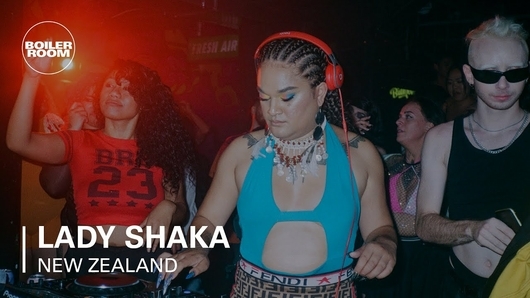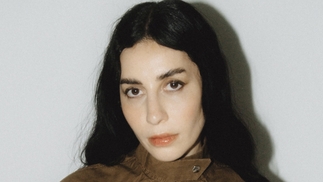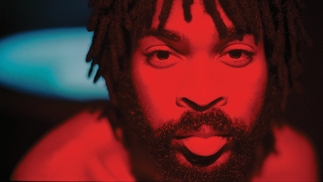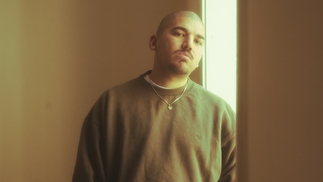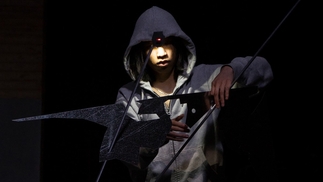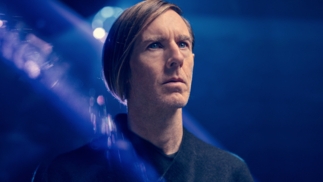Recognise: Lady Shaka
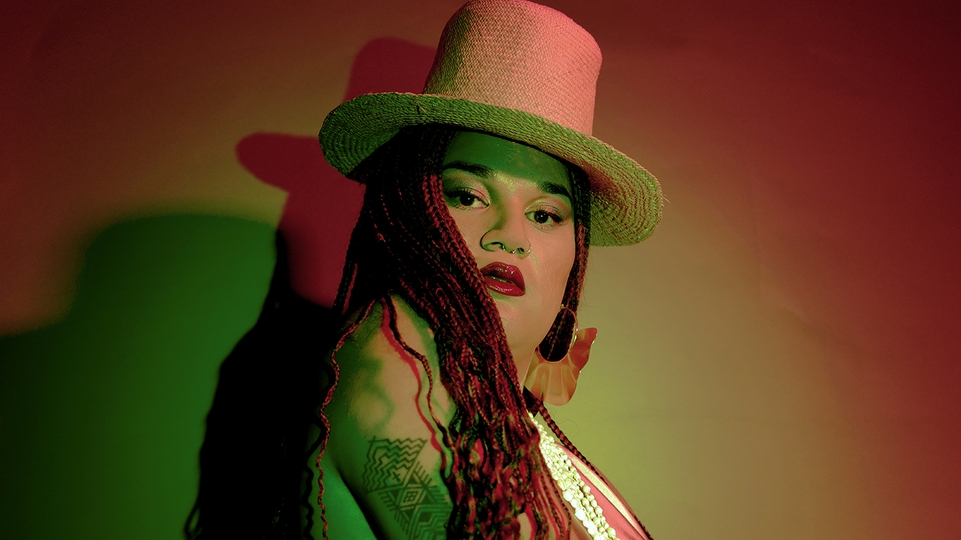
Global club beats, queer femme energy and Pacific Island identity come together in Lady Shaka’s joyful Recognise mix. Ahead of her appearance at Sónar Festival this month, the DJ and interdisciplinary artist speaks to Anna Cafolla about building connections around the world, uplifting her communities, and her Pasifika club sound
“Kia ora!” Lady Shaka greets New Zealand’s debut Boiler Room show. This is FILTH, a radical club community that centres QTBIPOC, and their first post-Covid lockdown live event. “I’m your girl Lady Shaka, and I dedicate this set to the beautiful people of the Pacific.” And this is Aotearoa, the Afro-Pasifika DJ and interdisciplinary artist’s home. “Chee-hu!” the crowd crows back.
Lady Shaka’s chrome gold stiletto nails move deftly across the decks, weaving propulsive dancehall and ‘00s pop, anthemic Oceania music, woozy club and explosive trap beats. Tunes from the Pacific Islands punctuate the set — opening with ‘Kotahitanga’ (translating as ‘unity’), a Māori language dance pop record, and ending on the Tongan classic ‘Fangai Lupe’. She does the Poi dance, a rhythmic Māori art using balls attached to flax strings. It’s spectacular to watch.
“Femme queens to the front!” the host demands. “Ballroom community to the front! I wanna see c***.” The crowd delivers. Voguing, whining, twerking ensues. Islanders rise up. “It was almost like my ancestors took over my body,” Lady Shaka tells DJ Mag today. “That was an experience I could never explain.”
A Lady Shaka performance is a bombastic celebration of her Pacific ancestry, queer femme identity, and vision of an inclusive, celebratory Afro-Pasifika diaspora culture. “The DJ scene in New Zealand, for a long time, was very white male dominated — where has it not been?! We — Indigdenous people — are not just rappers or singers, we can DJ. I believe this show helped to change the way the club scene is viewed here. That’s to view DJs as brown, Black, female, gender non-binary.”
Lady Shaka is leading a vibrant generation of young Pasifika DJs and producers. Moving to London six years ago, she started Pulotu Underworld in 2019, the city’s first club night that celebrates Pacific Island culture, while regularly performing killer sets for collectives and club nights in the UK and New Zealand — PXSSY PALACE, FILTH, Misery, and Juicebox.
“I remember going to my very first PXSSY PALACE and seeing someone in the crowd who I realised was a Pacific Islander,” she shares. “It’s an instant connection. I felt that very deeply, seeing someone like me in that space.
“There’s been a lot of reclamation and re-indigenising of spaces to make everyone feel safe, and welcomed,” she continues. Aotearoa is her home, but the UK is her beloved second, and the place where she first found DJing and a club community that celebrated all aspects of her identity. “The concept of home for me is finding places that make you feel connected,” she says. “It’s the smell of my mum’s cooking, aunties in Ridley Road market, or the laughter of my friends in a Dalston club.”
In 2016, the goal was to work in commercial dance. She spent her first two years in London dancing in theatre shows. “Hip-hop dance was definitely my first love, but it was when I started to go to different queer events, just as my visa was finishing, that I found DJing.”
Her first set in East London’s Vogue Fabrics was “pure euphoria”. “I found something that combined everything I love — music, moving my body, bringing people together,” she says. “I love to control the vibe of a room, bring the energy and positivity.”
Since, she’s been on Boiler Room and Keep Hush, collaborated with British brands like Stella McCartney and become Manchester-based, Angolan rapper IAMDDB’s official DJ. She was inspired by the heralding of DJ culture in the UK — its recognition as an art form, the celebration of soundsystem culture, the appreciation for selectors and subgenres.
She joined London’s Ngati Ranana, a Kapa Haka Māori indigenous performing arts group, and got to know Beats of Polynesia, a Pacific Islands dance group, and found a diaspora that shared food, sang songs, and performed traditional movements.
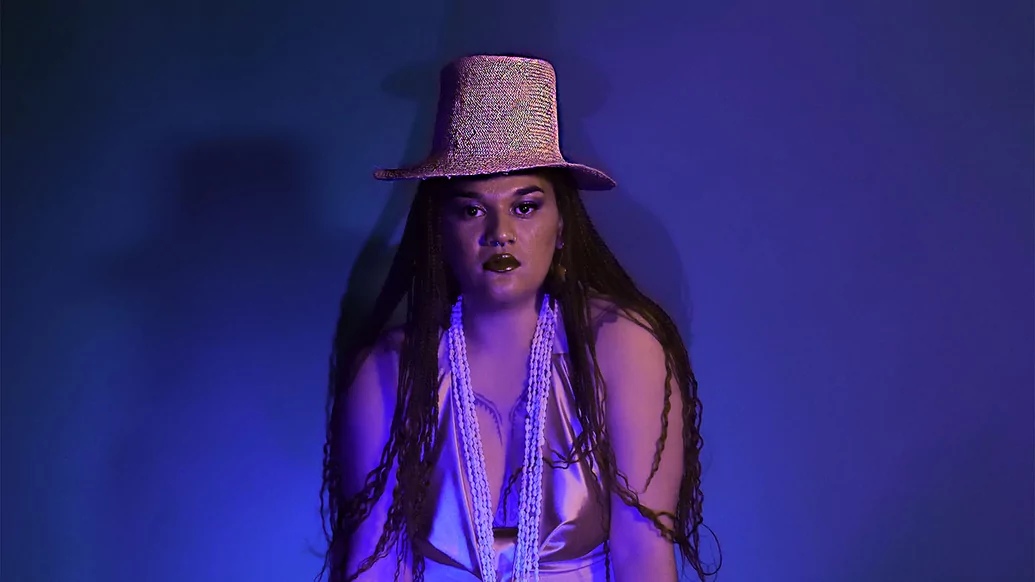
An early foray into DJing incorporated her love of dancehall, bashment, and moombahton. She began to consider her sound, and how she could infuse new spaces with her culture. A return trip to New Zealand to sort out her visa crystallised today’s culture-hopping sounds: “I was playing Pacific music for Pacific people. I brought in music my parents loved. It became a journey of taking what is old, and what is a part of my culture, and then mixing it with my identity as a femme queen and club kid.”
New Zealand’s ballroom community is “absolutely giving”, she says, and it’s finally being recognised for it. Lady Shaka attended her first ball in 2014, as she finished high school. She shouts out FAFSWAG, an Auckland arts collective of Māori and Pacific LGBTQI+ artists and activists. A striking memory is the sight of queens voguing around her school’s fields, while the boys played rugby nearby. “I remember seeing some of the girls voguing down outside West Auckland’s McDonald’s with music playing out of their phones,” she says. The community has been a major champion of the homegrown star — at any Lady Shaka night, expect femme queens and Islanders at the front, voguing and traditional movement intertwining beautifully.
Now there’s scheduled dates across Europe to look forward to, while also locking in Japan, India and Brazil. “I never thought that this little girl from West Auckland was going to be DJing even in the UK, let alone Croatia, Switzerland, or France,” she says. “Everytime I get booked for something new, it’s always a ‘pinch me’ moment.”
She’s soon supporting Honey Dijon for PXSSY PALACE — full circle indeed. “She’s an idol as a DJ for her community in the way I want to be for mine.” This summer, she’s bringing the Pasifika to Barcelona’s Sónar festival with two traditional dancers. It’s where Lady Shaka will also debut her first track from a forthcoming EP.
“Producing music is a new space for me,” she says. “I’m blessed to work with Pacific singers. There’s a song about connection and taking home wherever you are.” She’s worked with Arkuen, an Indigenous Colombian singer. “We share cultures to make something new,” she says.
Pasifika club is a genre she’s coining. “It mixes global, bassy, clubby music with our Indigenous sounds,” she explains. She learned traditional Māori instruments — taonga pūoro — including nose flutes and drums made generations before her from sharkskin and cowhide, to augment the sound. As her mother is part Tahitian, she took up Rutu pa’u, a style founded in the Cook Islands. “It was a stunning experience. I wanted to learn the foundations. I wanted to know the stories and nuances — drums for incoming war, for deaths or celebrations. I’m grateful I got to learn from the masters.”
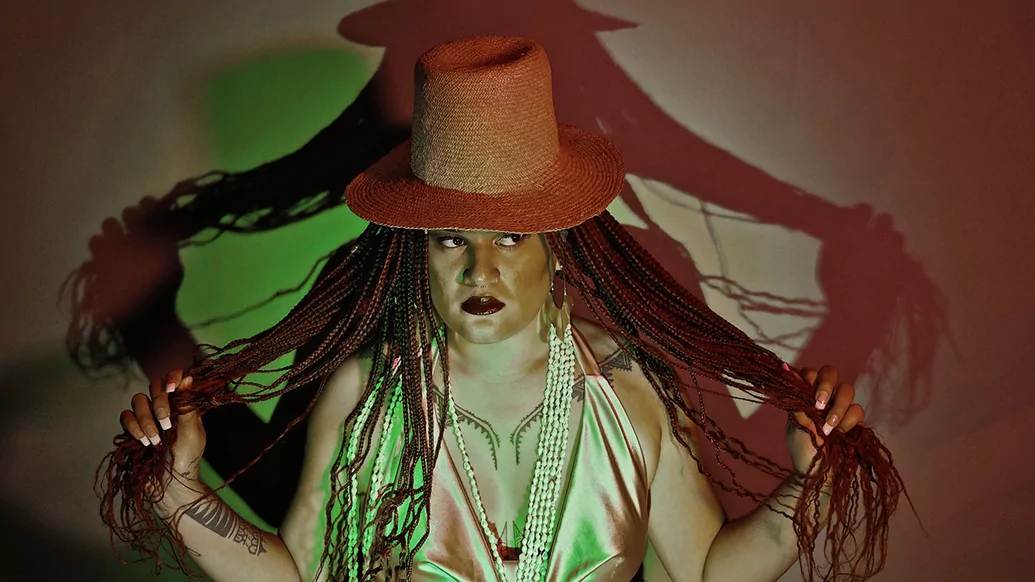
It was at a New Zealand gig back in January that she first heard about the Tonga volcano eruption. It was the biggest explosion ever recorded in the atmosphere by modern instrumentation, and scores of homes, fisheries and farms were destroyed. She organised Project Ofa, presented by Pulotu Underworld and supported by local LGBTQI+ organisation Rainbow Youth. Despite Covid restrictions tightening in that time, the online music fundraiser was a success and divided proceeds between organisations for food and shelter, rebuilding work, and the queer communtiy. The line-up included Tāmaki Makaurau R&B artist Disciple Pati, Berlin-based Tongan singer Noah Slee, and Lady Shaka herself.
“If I’ve got a platform, I need to use it,” she says assuredly. “How can I open doors for others? How can I help our nations?” She points to one of the islands her family hails from, Tokelau, and the rising water levels. “Our grave sites are being washed out into the ocean. I want to use my platform to talk about climate change and raise up Pacific voices that are constantly left out of conversations.”
Her relationship to the club, the queer community, and everyone who percolates in and across the spaces is reflected back into her culture, familial and ancestral connections. “The main thing for me has always just been about respect, and being open to unique perspectives.”
She’s inspired by South Asian collectives and platforms like Daytimers, Dialled In, and Diet Paratha. “There’s a mutual understanding with POC globally,” she says. “The diaspora has a critical thinking that is vital to the music community going forward. It feels special in London, to all cross paths from around the world and shape the industry as we pull from all of our cultures.” That supportive spirit is palpable — on the day we chat, she’s heading to NTS Radio to support DJ Half Queen’s guest slot. Instagram stories from the booth are jubilant, yells of “Chee hu!” abundant.
Pulotu Underworld recently returned with their first IRL event in three years at Vogue Fabrics, welcoming Indigenous DJs including Māori and Tongan resident Keanu, Half Queen all the way from Aotearoa, DJ alieXpress, and Lady Shaka too. “It’s an exciting time to see DJs from the Pacific and diaspora in Europe,” she says. “I’m desperate to get them booked for gigs, for us all to share those parties!”
In the Polynesian traditions, ‘Pulotu’ is the resting place of the dead. In this new-world club space, Pulotu Underworld finds light and life in each other. There’s a Māori proverb, ‘Ahakoa he iti, he pounamu’: ‘Although it is small, it is of great value’. It’s a simple, powerful metaphor for endurance and strength that speaks to Lady Shaka’s world-expanding vision for her music and community.
Listen to Lady Shaka's Recognise mix, and find the tracklist, below.
Tracklist:
Lady Shaka & Heimoana Mai ‘Moment 4 To’ere (UNRELEASED)’
Espree x Jakobin ‘ Ritual’
Qnoe & Sarah ‘Romantic’
Sorensen ‘Body (Sorensen Gqom Remix’
Dj mOma ‘Good Girl One Time’
RDX ‘Bend Over (Sorensen Hard Drum Remix)’
TJ Groover ‘Feel Up (Demo)’
Mar’One ‘Just Won’t Do Dub’
Omar ‘Chaka’
Beenie Man ‘Dude (Sorensen Edit)’
Boof ‘Luam Has Found Her Z’
Mokotron ‘Indigenous Bass Revolution’
Arma ‘Clap Trak’
Lady Shaka, Infrequent Flyer, Chapters ‘Malie Malie (Unreleased) ‘
Lady Shaka, Soraya La Pread ‘Pulotu (Unreleased’
Lazy Flow, Warda ‘Haramt Ahebak (Vogue Edit)’
Assala Nasri ‘Bent Hakaber (Lazy Flow Vogue Edit)’
DJ Noiz ‘Chimbala Work Remix’
SillyVilli
‘Ibadi Mashup’
Marina ‘Pei o Auma/ Si Fe’e’
Ahadadream ‘Piano Skank’
BJF & Couvre x Chefs ‘Jamuna’
D-DOTs, M.I.A ‘Boyz (D-DOTs Remix)’
Mina ‘Zombies’
DJ Colastraw & Deejay Soso ‘The Boy Is Mine (Amapiano Mix)’
FKA Twigs ‘Papi Bones (Patrick ‘HardAma Remix)’
Pasquinel ‘Eternal Light Edit’
Ayra Starr ‘Bloody Samaritan (Dave Nunes Remix)’
Tamia ‘So Into You (Omar Duro Nola Bounce Mix)’
Beyoncé ‘Before I Let Go’

